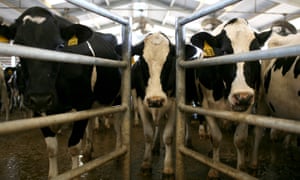NYT laments: ‘How Bad Is Your Air-Conditioner for the Planet?’ ‘Releases 100 million tons of CO2 each year’
So can I use my air-conditioner guilt free?
Not quite. Air-conditioning presents other problems: As of 2009, nearly 90 percent of American homes have air-conditioners, which account for about 6 percent of all the country’s residential energy use. All that air-conditioning releases about 100 million tons of carbon dioxide each year.
Short Answers to Hard Questions About Climate Change
The issue can be overwhelming. The science is complicated. We get it. This is your cheat sheet.

According to historians and others, the widespread availability of air-conditioning has allowed for more development in the hotter parts of the country — the South and the Southwest — where air-conditioning use is the highest in the country.
And once developers could rely on heating and cooling technologies, they often built less energy-efficient homes, which means that you have to use more air-conditioning or heating to get to the temperature you want.…
Dairy groups warn climate regs may lead to ‘exploding cows’
California wants to limit the amount of greenhouse gas emitted by belching and farting of 5.5 million cows, but the industry is hitting back with a dose of reality

Dairy groups blast methane reductions: ‘Cows expel gas so they don’t explode’…
Climate Retreat? California Legislature May Ditch Plan to Radically Reduce Emissions
One ominous sign: The Democratic leader of the Assembly has not thrown his weight behind the bill.
“For us, it’s not imperative that it get done this year,” said Anthony Rendon, who has a background as an environmentalist but rose to speaker this year with support from a powerful bloc of business-friendly Democrats. “It’s a program that has had its success, but at the same time there are some corrections that could be made. We just want to make sure that if we’re going to set something up for the long term, that we get it right.”
Senate Bill 32 is shaping up as the biggest fight lawmakers are likely to tackle in what remains of the legislative year. It pits environmentalist Democrats, mostly from the state’s more prosperous coastal areas, against Democrats and Republicans from struggling inland areas who side with oil companies and other businesses, and whose constituents could be harder hit by rising energy prices.
The bill, which sets ambitious targets to cut planet-warming emissions by 2030, faces a critical deadline with the Legislature set to wrap up for the year on Aug. 31.
Paris agreement failing — only 0.04% of global CO2 emissions “ratified” (1% of man-made CO2)
Paris agreement failing — only 0.04% of global CO2 emissions “ratified” (1% of man-made CO2)
It’s was a grand theater. Greens brag that the Paris agreement was signed by “179 countries”, but it means nothing until they get 55 nations controlling 55% of the worlds (man-made) emissions. Right now, they’ve had a resounding response from no country that matters. What they need: Entry into force In accordance with Article 21, paragraph 1, of the Paris Agreement, the Agreement shall enter into force on the thirtieth day after the date on which at least 55 Parties to the Convention accounting in total for at least an estimated 55 % of the total global greenhouse gas emissions have deposited their instruments of ratification, acceptance, approval or accession with the Depositary. What they’ve got: 22 states which produce 1% of man-made emissions. Paris Agreement – Status of Ratification As of 2 August 2016, there are 179 signatories to the Paris Agreement. Of these, 22 States have also deposited their instruments of ratification, acceptance or approval accounting in total for 1.08 % of the total global greenhouse gas emissions. So only 33 countries and 54% of global emissions to go. (And they obviously mean “human emissions”, not “global emissions” or they’ll have to get […]Rating: 0.0/10 (0 votes cast)
— gReader Pro…
Little Green Lies: Why Electric Cars Won’t Save the Environment
…You Could Pay More to Fly Under This EPA ‘Climate Change Rule’
http://joemiller.us/2016/07/pay-fly-epa-climate-change-rule/…
EPA Gives Itself The Power To Regulate CO2 From Airplanes
…‘We’re Actually Using More Fossil Fuels Than Ever’
…Fuel efficient cars may be churning out MORE pollutants than previously thought
EPA Indicates Still More Rules On Emission Standards Are Coming
EPA Indicates Still More Rules On Emission Standards Are Coming
http://dailycaller.com/2016/07/18/epa-indicates-still-more-rules-on-emission-standards-are-coming/
‘Rapid pace’
— gReader Pro…
